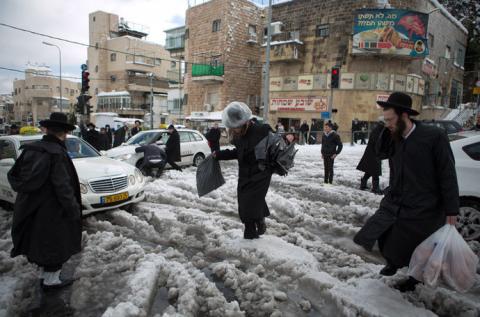Snowstorm provides Israel with a chance to blitz a long-standing problem
It has been announced that State Comptroller Joseph Shapira will investigate the authorities’ preparedness ahead of the winter storm that turned this past Friday, December 13 – which was also the Tenth of Tevet (a Jewish fast day) – into one terrifying combination. This is a Pavlovian response, characteristic and futile. There is no benefit to having another report in a long series of comptroller's reports. It will not change anything, nor will it improve preparedness for another anomalous event.
In the past seven years, the Israeli home front – or a large portion of it – has experienced five distressing events: 2006's Second Lebanon War; 2008-09’s Operation Cast Lead in Gaza; the 2010 Mount Carmel forest fire disaster; 2012’s Operation Pillar of Defense in Gaza; and now what will soon be referred to as last year’s snowfall.
In every case the story was similar, if not identical. There was a state comptroller's investigation, sometimes before the event (as with the firefighting service ahead of the Mt. Carmel fire), usually after it, but no significant change was implemented. Sometimes, damage was inflicted by providing an excuse for waiting until the investigation was completed and creating a sigh of relief when it ended without anyone losing their head.
The previous state comptroller, Micha Lindenstrauss, created outsized expectations for the outcome of his investigation following the Carmel forest fire in December 2010. Ministers hired expensive lawyers and wailed about the bitterness of their fate until it sickened journalists’ ears. The state comptroller laid special and ultimate responsibility for the response to the tragedy on the ministers, but nothing happened. The politicians yawned and the public – aside from the 44 victims’ bereaved families – remained apathetic.
The Carmel fire and subsequent report were not the reasons Yuval Steinitz and Eli Yishai lost their posts as finance minister and interior minister, respectively, following last January's election when the current Netanyahu government was formed.
Prime Minister Benjamin Netanyahu, the man behind the supertanker plane that arrived too late to assist much in putting out the Carmel forest fire, was careful this time not to claim he had predicted the weather disaster and undertaken preparations ahead of it. But he was stubborn in masquerading as Churchill, going down to be with "his" people suffering during the Blitz and making ridiculous announcements. He ordered that it be verified that secondary traffic routes were open and instructed that welfare activities be assisted. What would we do without him?
What is the prime minister’s job, exactly? To give prime ministerial advice? The moment an event strikes, there is no need for any minister in the command room. Operational authorities handle things best without political involvement.
The contribution of ministers, and the one who oversees them, is supposed to be in the years leading up to the event, in planning, budgeting and delineating boundaries, approving a fighting doctrine and standing orders that will be taken out of the safe on the given day. During the event itself, when these politicians come to be photographed without their suits and ties, like they came to get down to work, they are superfluous and only interfere.
What the government must do has been known for two decades, since the barrage of Iraqi missiles hit Israel during the Gulf War at the beginning of 1991: The Home Front Command, which was founded on the ruins of its predecessor, the Civil Defense, should be transferred to the Israel Police or the ministry that supervises it. Also, it should be led by a commissioner, not a general.
The Israel Defense Forces should not handle the civilian front. There will always be a need for interorganizational cooperation, and protecting and provisioning the population will require intelligence warnings, the interception of missiles and maybe the airlifting of supplies. However, this kind of cooperation occurs within the army between Home Front Command, Military Intelligence and the air force. Bearing in mind the (nonmilitary) national service that is set to expand in the future, it would also be better to make it a civilian affair as part of a social vision that views positively shrinking the IDF’s role in society.
The opportunity to arrange the apparatus that handles the home front should be taken now, to finally place it under the responsibility of the public security minister and get rid of this little home defense ministry and let the IDF chief of staff focus on the front.
When a squadron of F-15s is attacking Iran, the infantry and armored corps are fighting Hezbollah and Hamas, and special forces are operating deep in another place, the last question the IDF chief of staff needs to be involved in is whether the residents of Safed have their electricity back.
Apropos the home front and the IDF, there is an army connection to this December of Israel Electric Corporation power outages. IEC CEO Eli Glickman was a leader of an elite naval commando unit, Shayetet 13, while its chairman, Yiftach Ron-Tal, was a major general and commander of land forces. It just goes to show, yet again, that senior officers do not provide an added advantage in managerial roles, not even in preparing for emergency scenarios.
Amir Oren

